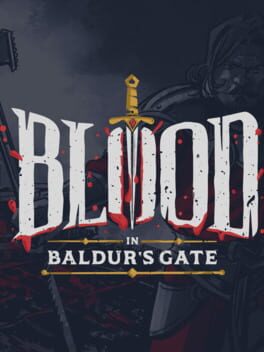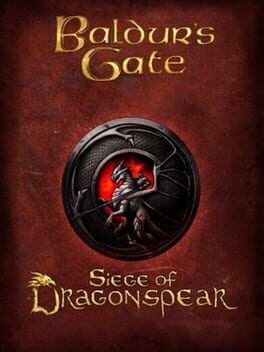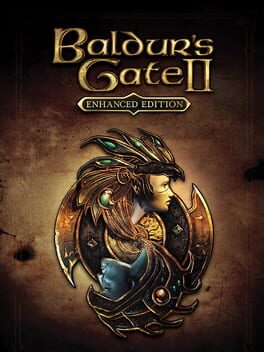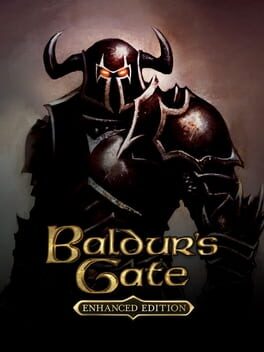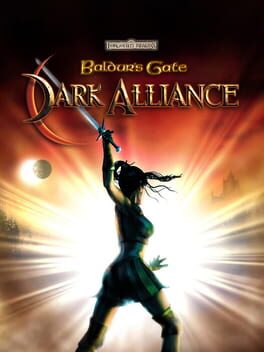

An ancient evil has returned to Baldur's Gate, intent on devouring it from the inside out. The fate of Faerun lies in your hands. Alone, you may resist. But together, you can overcome.
Also in series
Released on
Genres
Reviews View More
Não esperava jogar isso quando ele foi anunciado, mas foi dar uma chance que simplesmente pegou. A jogabilidade repleta de recursos e liberdade para o jogador, e os personagens cativantes definem a qualidade desse título, sendo uma das maiores surpresas de 2023. É um jogo único, um evento que não consigo ver se repetir tão cedo.
I didn't expect to play this when it was announced, but giving it a chance simply hooked me. The gameplay is full of features and freedom for the player, and the captivating characters define the quality of this title, making it one of the biggest surprises of 2023. It's a unique game, an event I can't see being repeated anytime soon.
I didn't expect to play this when it was announced, but giving it a chance simply hooked me. The gameplay is full of features and freedom for the player, and the captivating characters define the quality of this title, making it one of the biggest surprises of 2023. It's a unique game, an event I can't see being repeated anytime soon.
This game is a masterpiece. The characters, the gameplay, the stories being told, the visual style. Everything clicks: The gameplay has incredible depth thanks to the many possible interactions with the environment, the enemies or your party of adventurers. You can pic up an enemy and throw them off a cliff, use them as an improvised weapon or throw them into another foe in range. You can set up ambushes and modify the terrain with barrels. You can combine elemental effects. You can sneak to a potential enemy and pickpocket their potions and grenades so they have no consumables during combat. You can drop your flaming torch on the ground and have your party coat their weapons in fire. etc. The characters have layers and personalities which are affected by your actions. There are multiple ways their stories can progress which are affected on multiple levels from your starting choices in character creator to the actions you take during your adventures. The visual style is beautiful and on a technical level the game is impressive since the maps are massive and full of objects that can be destroyed, burned, moved around. Masterpiece.
This review contains spoilers
Baldur's Gate 3 is often praised both for its large scope of choice and its player freedom, but I'm beginning to wonder if those two concepts are even compatible.
To me, what defines a compelling choice is sacrifice. This could mean a character disliking you, an item being destroyed, having to spend limited resources, or a character's death. Not every choice can demand you give something up, though, nor should it. Sometimes, a choice is between two story routes, two pieces of loot, or recruiting one of two characters. But what complicates these choices is that the options are mutually exclusive. You're strictly better off than before no matter what you choose, but you're making the decision to take one option and leave the other behind.
If to choose is to sacrifice, then to have freedom is to gain. To gain loot, EXP, quests, and allies without being held back. To do whatever you want.
Therein lies the contradiction. To make an interesting choice you need to be willing to give something up, but to be free you need to have access to whatever you want.
Baldur's Gate 3 wants you to have your cake and eat it too, and then gives you even more cake to top it off. It's a virtual dollhouse. No matter what you do, you can't be asked to sacrifice anything, because that would compromise player freedom, which is valued above all else.
Minthara, to me, represents BG3's refusal to demand sacrifice. In Act 1 you're asked to choose: protect a grove of druids full of tiefling refugees from goblin cultists, or side with the cult and slaughter everyone in the grove. In theory, Minthara is your reward for siding with the cult. The grove has much more going for it; you get three companions (Wyll, Karlach, and Halsin), and the tieflings appear again in later acts with sidequests and excellent loot. Even worse, siding with the cult has no benefits in making allegiances, since you infiltrate them in Act 2 either way and they turn on you either way. But at least you get Minthara as a companion. She doesn't have a questline or anything like everyone else does. But at least it's something.
Except, wait, Larian patched in a way to recruit Minthara while siding with the grove. You just need to attack her non-lethally while raiding the cultists. You can then recruit her in Act 2. There is almost no roleplay reason you would spare Minthara and only Minthara. This is entirely a metagame trick. But it doesn't have to make sense, because the fans want to gain Minthara without sacrificing the grove.
BG3 has the issue in general with "good" and "evil" choices. When you're good you're showered in praise, loot, and EXP. When you're evil you skip plotlines with no alternatives.
Okay, fine, you do, technically, have the ability to make choices in BG3. It's just that your choices are always between a reward and nothing, or a penalty and nothing. There's always a "correct" choice, where you win every reward there is to win and avoid every penalty there is to avoid. Rarely are choices mutually exclusive. Often your choice is to complete a sidequest or skip it. The worst unavoidable penalty you can ever receive is companion disapproval, which is completely binary and is easy to max out on everyone other than Astarion and Minthara by being a goody two-shoes hero.
As much as I hate to admit it, on my good-aligned playthrough, I sided with the grove and recruited Minthara. I'm not here to condescend because I care about the sanctity of choice or whatever. We've all heard "Given the opportunity, players will optimize the fun out of a game," and I'm no different. Why would I be? Recruiting Minthara is a reward or nothing choice. I lose nothing by recruiting her.
Even worse, sometimes "optimizing the fun out of the game" really does feel intended. In Act 2, I was tasked with freeing Mizora from a mind flayer pod. I'm a filthy minmaxer and had my character's intelligence at 8. I was given the "choice" of two levers to free her, but because I was dumb as rocks, I failed two intelligence checks to read the labels. I picked one at random. Unfortunately, I picked wrong, because Mizora and Wyll both immediately died, Wyll's soul condemned to the Hells. So of course I reloaded, picked the right lever, and saved Mizora. She even gave me a cool sword because Wyll was in my party. So my "choices" here were "kill Wyll irreversibly with no benefit" or "get a cool sword and Wyll survives." Even worse, I was forced to make that choice completely blind because I failed two rolls that would help inform my choice. Or, to eliminate the randomness, I could metagame by either save-scumming, or switching party members until I pass the check to read one of the labels. But then I'm being actively rewarded for optimizing the fun out of the game. I can see no reason why I would want to let Wyll die here.
And oh, the dice rolls. There's always a "correct" choice, but sometimes you're locked out of that choice because you happened to roll a 1, guaranteeing failure. You can entirely miss Gale, a companion with his own questline, because you got a critical failure when saving him right at the start of the game. Gale's absence offers no alternative storylines. Saving Gale is reward or nothing, entirely at the mercy of the dice. Yes, rerolling with inspiration mitigates this, but my point stands.
I don't know where else to add this, but I want to add that it frustrates me how often your choices boil down to "persuade" or "kill." People attack you for the most minor of disagreements and are ready to throw their lives away or become murderers with no way to de-escalate other than to run away. It makes everything feel very gamified, like Larian felt it a waste to not use the game's combat system as often as possible.
My impression of the game is that its replayability comes not from its vast network of choices, but from its sheer volume of content. You're likely to miss certain quests or areas without a guide, and if you make the "incorrect" choice you cut off future content. To me, that isn't compelling, and doesn't warrant another playthrough.
Despite all my previous criticism, I did genuinely have fun with the game. Exploration and theorycrafting are two things I love in general, and Baldur's Gate 3 kept me satisfied in those two aspects for over a hundred hours before I burnt out. But when I see such lofty praise for this game, I realize high-budget games will always be beholden to fan expectations and demands for player freedom over interesting limitations. I'm worried this will be the golden standard for choice in video games going forwards, and I can't help but feel a little bitter.
To me, what defines a compelling choice is sacrifice. This could mean a character disliking you, an item being destroyed, having to spend limited resources, or a character's death. Not every choice can demand you give something up, though, nor should it. Sometimes, a choice is between two story routes, two pieces of loot, or recruiting one of two characters. But what complicates these choices is that the options are mutually exclusive. You're strictly better off than before no matter what you choose, but you're making the decision to take one option and leave the other behind.
If to choose is to sacrifice, then to have freedom is to gain. To gain loot, EXP, quests, and allies without being held back. To do whatever you want.
Therein lies the contradiction. To make an interesting choice you need to be willing to give something up, but to be free you need to have access to whatever you want.
Baldur's Gate 3 wants you to have your cake and eat it too, and then gives you even more cake to top it off. It's a virtual dollhouse. No matter what you do, you can't be asked to sacrifice anything, because that would compromise player freedom, which is valued above all else.
Minthara, to me, represents BG3's refusal to demand sacrifice. In Act 1 you're asked to choose: protect a grove of druids full of tiefling refugees from goblin cultists, or side with the cult and slaughter everyone in the grove. In theory, Minthara is your reward for siding with the cult. The grove has much more going for it; you get three companions (Wyll, Karlach, and Halsin), and the tieflings appear again in later acts with sidequests and excellent loot. Even worse, siding with the cult has no benefits in making allegiances, since you infiltrate them in Act 2 either way and they turn on you either way. But at least you get Minthara as a companion. She doesn't have a questline or anything like everyone else does. But at least it's something.
Except, wait, Larian patched in a way to recruit Minthara while siding with the grove. You just need to attack her non-lethally while raiding the cultists. You can then recruit her in Act 2. There is almost no roleplay reason you would spare Minthara and only Minthara. This is entirely a metagame trick. But it doesn't have to make sense, because the fans want to gain Minthara without sacrificing the grove.
BG3 has the issue in general with "good" and "evil" choices. When you're good you're showered in praise, loot, and EXP. When you're evil you skip plotlines with no alternatives.
Okay, fine, you do, technically, have the ability to make choices in BG3. It's just that your choices are always between a reward and nothing, or a penalty and nothing. There's always a "correct" choice, where you win every reward there is to win and avoid every penalty there is to avoid. Rarely are choices mutually exclusive. Often your choice is to complete a sidequest or skip it. The worst unavoidable penalty you can ever receive is companion disapproval, which is completely binary and is easy to max out on everyone other than Astarion and Minthara by being a goody two-shoes hero.
As much as I hate to admit it, on my good-aligned playthrough, I sided with the grove and recruited Minthara. I'm not here to condescend because I care about the sanctity of choice or whatever. We've all heard "Given the opportunity, players will optimize the fun out of a game," and I'm no different. Why would I be? Recruiting Minthara is a reward or nothing choice. I lose nothing by recruiting her.
Even worse, sometimes "optimizing the fun out of the game" really does feel intended. In Act 2, I was tasked with freeing Mizora from a mind flayer pod. I'm a filthy minmaxer and had my character's intelligence at 8. I was given the "choice" of two levers to free her, but because I was dumb as rocks, I failed two intelligence checks to read the labels. I picked one at random. Unfortunately, I picked wrong, because Mizora and Wyll both immediately died, Wyll's soul condemned to the Hells. So of course I reloaded, picked the right lever, and saved Mizora. She even gave me a cool sword because Wyll was in my party. So my "choices" here were "kill Wyll irreversibly with no benefit" or "get a cool sword and Wyll survives." Even worse, I was forced to make that choice completely blind because I failed two rolls that would help inform my choice. Or, to eliminate the randomness, I could metagame by either save-scumming, or switching party members until I pass the check to read one of the labels. But then I'm being actively rewarded for optimizing the fun out of the game. I can see no reason why I would want to let Wyll die here.
And oh, the dice rolls. There's always a "correct" choice, but sometimes you're locked out of that choice because you happened to roll a 1, guaranteeing failure. You can entirely miss Gale, a companion with his own questline, because you got a critical failure when saving him right at the start of the game. Gale's absence offers no alternative storylines. Saving Gale is reward or nothing, entirely at the mercy of the dice. Yes, rerolling with inspiration mitigates this, but my point stands.
I don't know where else to add this, but I want to add that it frustrates me how often your choices boil down to "persuade" or "kill." People attack you for the most minor of disagreements and are ready to throw their lives away or become murderers with no way to de-escalate other than to run away. It makes everything feel very gamified, like Larian felt it a waste to not use the game's combat system as often as possible.
My impression of the game is that its replayability comes not from its vast network of choices, but from its sheer volume of content. You're likely to miss certain quests or areas without a guide, and if you make the "incorrect" choice you cut off future content. To me, that isn't compelling, and doesn't warrant another playthrough.
Despite all my previous criticism, I did genuinely have fun with the game. Exploration and theorycrafting are two things I love in general, and Baldur's Gate 3 kept me satisfied in those two aspects for over a hundred hours before I burnt out. But when I see such lofty praise for this game, I realize high-budget games will always be beholden to fan expectations and demands for player freedom over interesting limitations. I'm worried this will be the golden standard for choice in video games going forwards, and I can't help but feel a little bitter.

